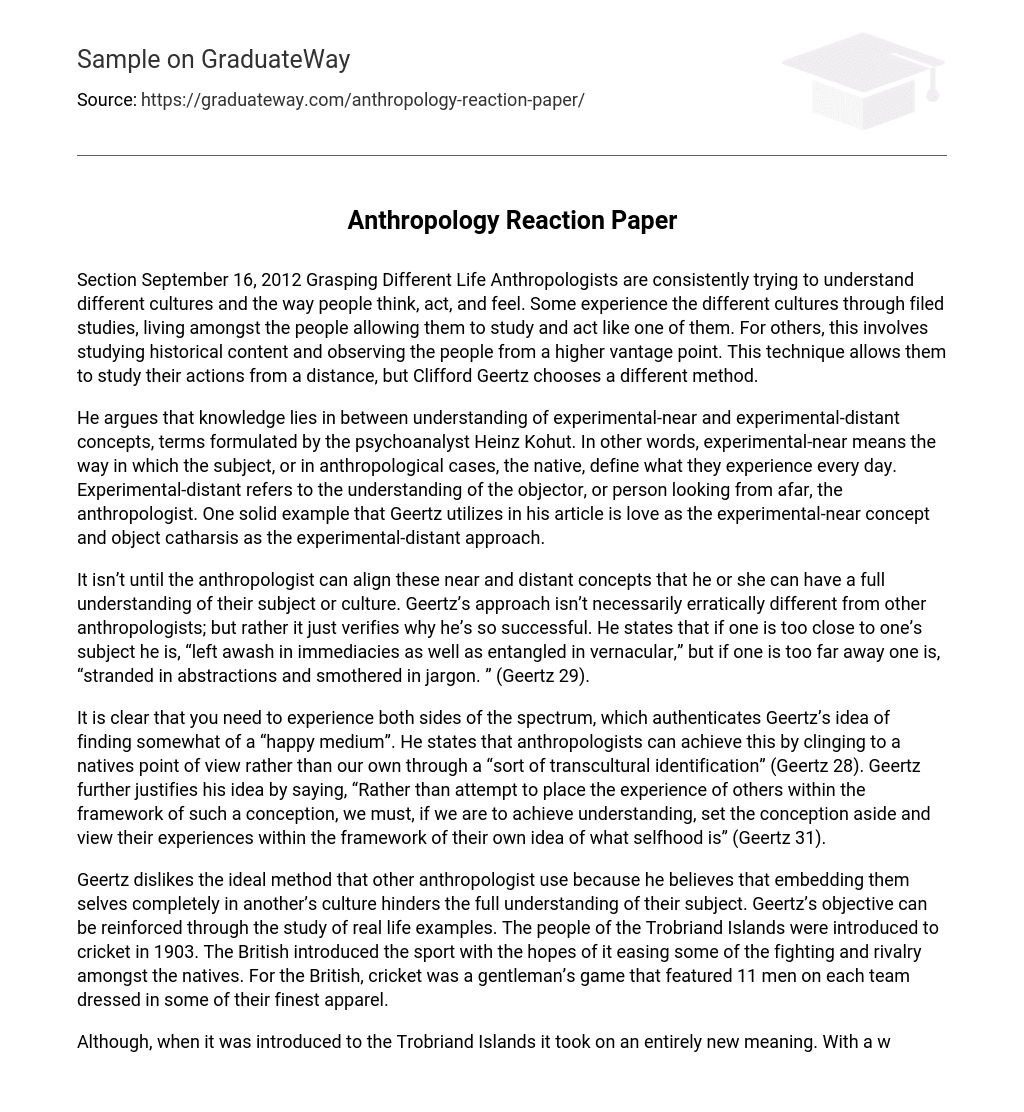Anthropologists consistently strive to understand different cultures and the way people think, act, and feel. Some experience these cultures through field studies by living amongst the people, allowing them to study and act like one of them. For others, this involves studying historical content and observing the people from a higher vantage point. This technique enables them to study their actions from a distance, but Clifford Geertz chooses a different method.
According to Geertz, knowledge is situated between the comprehension of experimental-near and experimental-distant concepts. These terms were introduced by psychoanalyst Heinz Kohut. Experimental-near pertains to how the subject or native defines their daily experiences, while experimental-distant refers to how an objector or anthropologist views them from afar. Geertz cites love as an example of an experimental-near concept and object catharsis as an experimental-distant approach in his article.
For an anthropologist to have a complete understanding of their subject or culture, they must align both near and distant concepts. Geertz’s approach is not drastically different from other anthropologists, but it does explain why he is successful. He argues that being too close to the subject can result in being left awash in immediacies as well as entangled in vernacular,” while being too far away can leave one “stranded in abstractions and smothered in jargon” (Geertz 29).
It is clear that experiencing both sides of the spectrum is necessary to authenticate Geertz’s idea of finding a “happy medium”. According to Geertz, anthropologists can achieve this by adopting a native’s point of view through a “sort of transcultural identification” (Geertz 28). He further justifies his idea by stating that understanding others requires setting aside our own conception and viewing their experiences within their own framework of selfhood (Geertz 31).
Geertz dislikes the ideal method that other anthropologists use because he believes that embedding themselves completely in another culture hinders their full understanding of the subject. Geertz’s objective can be reinforced through the study of real-life examples. In 1903, the people of the Trobriand Islands were introduced to cricket by the British, who hoped it would ease some of the fighting and rivalry among natives. For the British, cricket was a gentleman’s game featuring 11 men on each team dressed in some of their finest apparel.
When introduced to the Trobriand Islands, the game took on an entirely new meaning. With a deep-rooted sense of war in their culture, the Trobriand people turned it into a battle game. Teams of 50 or more would cover themselves in war paint and attire before competing in an organized tribal dance. The Trobriand Islands placed great value on community, making the game a popular spectator sport with as many community members participating as possible.
In the end, cricket was more than just a sport or organized gathering. From an experience-distant point of view, it may seem that way, but an experience-near perspective reveals an event centered around exchanging and showcasing performance and identity. Winning did not determine one’s status; rather, different communities were able to express themselves through dance and culture. As open-minded as anthropologists are supposed to be, it can still be challenging to avoid assuming that ideas from one culture do not exist in another.
A great example comes from Bohannan’s Shakespeare in the Bush. Bohannan went into her field study with the implication that human nature is pretty much the same the whole world over” (Bohannan 1). However, when she visited the Tiv in Africa, her perspective was seriously adjusted as she shared the “universal” story of Hamlet. The Tiv found many of the themes of Hamlet to be completely absurd. For instance, the word “ghost” doesn’t even have a translation into the language of the Tiv people because their view of supernatural is completely different.
They believed that the ghost of Hamlet’s father must have been the result of witchcraft, and they were in an uproar. From an experience-near outlook, the idea of a ghost was non-existent, while from an experience-distant perspective, Hamlet’s father was simply a ghost. However, since every culture has different beliefs and views, stories like Hamlet can be interpreted in various ways. Anthropologists use concepts such as experience near and distant which are apparent in everyday life.
We often overlook the mere existence of others, and it isn’t until we delve into their lives and try to understand their thoughts and actions that they become more apparent. Geertz’s idea that knowledge lies in the middle is the best way to fully comprehend the world around us. In everyday life, we are constantly reminded to find a happy medium,” which is precisely what Geertz did. Allowing yourself to experience things from different angles is the best approach to truly understanding whatever you are trying to comprehend.





